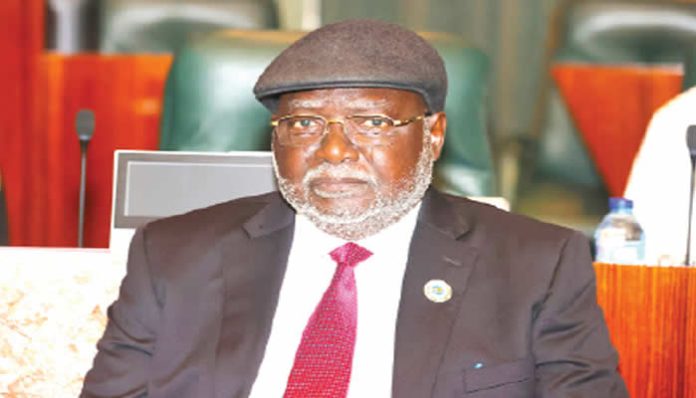

The Chief Justice of Nigeria, Justice Olukayode Ariwoola, has said the judiciary will not relent in the efforts to continue to assert its independence and be an impartial arbiter.
This was as he harped on the need for judge to continue to build capacity to be able to live up to the societal expection in the discharge of their duties.
The CJN spoke at a workshop with the theme: “Judicial independence and judge craft,” organised by the National Judicial Institute in collaboration with the Forum Against Counterfeiting, in Abuja.
He said despite significant progress made in attaining judicial independence, more still needed to be done.
“Ongoing and sustained effort are still required to address the challenges faced. We will not relent in seeking better options and actions that will ensure that the Nigerian judiciary remains a strong, impartial and independent arbiter of justice and the rule of law,” Justice Ariwoola said.
The CJN added that judges must boost their capacities as way of restoring confidence in the judiciary.
He said, “The act and science of judging requires deep and contextual understanding of the law, commitment to do justice and the innate ability to apply legal principles to complex and often vexatious issues without fear of favor.
“I must also reiterate that the substantive requirements of judicial independence, judge craft and the art of judging are built around public expectations for judges to decide matters before them fairly impartially and on the basis of facts.
“Such decisions must go in accordance with the law, without restrictions, improper influences, inducements, pressures, threats or interference, directly or indirectly, from any quarter of for any reason.”
Global Chairman of FAC, Dr Anthony Idigbe (SAN), spoke on the use of technology in case management to achieve efficiency.
He referred to Grudin’s Law, which suggests that when those who benefit from a technology are not those who do the work, the technology is likely to fail or be subverted.
According to him, digital transformation is not about technology but people and processes.
He gave tips as to how the people issues in digital transformation in the judiciary can be resolved.
Idigbe, Senior Partner at Punuka Attorneys and Solicitors, said FAC was focused on promoting the rule of law generally but with a particular focus on anticounterfeiting.
NJI Administrator, Justice Salisu Abdullahi, described the pursuit of justice as the cornerstone of any thriving democracy.
He said, “It is essential that our judicial system operates with utmost efficiency and effectiveness to uphold the principles upon which our nation was founded.
“In this light, concerted efforts must be made towards the timely resolution of cases, the streamlining of legal procedure and the elimination of unnecessary delays.
“It is imperative that we ensure that justice is not only done but is done in a manner that respects the rights and needs of all parties involved as swift justice instills confidence in our legal system.
“The theme of this workshop could not have come at a better time than now as it is designed to afford the justices and judges the opportunity to appraise the judicial system and consequently suggest conventions for improvement.
“As society evolves, we must continue to be dynamic and pragmatic in order to adequately address the conflicts that will inevitably arise, bearing in mind that the only constant thing in life is change.
“In order achieve efficiency and effectiveness, we must in invest in technology, case management, continuing judicial education and access to justice, among others.”
Retired Justice of the Supreme Court, Amina Augie, noted that the power of the judiciary lies in the confidence the people have in its activities and decisions, which every judge must protect.
“We need to be able to show that justice is not only done, it is seen to be done, and that in the judgment you write, in whatever you are doing, they are able to see and trust that you are doing the right thing, and that you are deciding fairly,” she said.
She added that it is the process of creating the type of judgments that sustain public confidence in the system that constitutes the art and craft of judging.
Drawing from her experience, Justice Augie noted judgment writing is tedious and requires commitment on the part of a judge to be able to weave together all the issues involved in a case and deliver a lucid verdict.
She cautioned against judges allowing others to write judgments for them, noting that a judge’s judgment reflect who he is.
A judge of the National Industrial Court, Justice Nelson Ogbuanya, urged the judiciary to reassess its communication strategies to change some public perceptions that are misconceived.
He said: “Nigerian judiciary gained notoriety for adjournments and delays not because every court or every judge is involved, but because that is the posturing that has been communicated and perceived by the people.
“If one court is inefficient, it rubs off on the entire judiciary, as it is has also been rhetorically echoed: ‘Go to court!’ The corporate culture of the Nigerian judiciary should be passionately positive in its vision and mission.
“Deliberate and constant monitoring and benchmarking of judicial performance in efficiency and integrity would be recipe for rebranding the perceived communication of inefficiency and corrupt tendencies, with which the judicial system in Nigeria has been branded and labelled.
“Concerted efforts should, therefore, be geared towards re-branding the perceived negative public branding of the Judiciary as communicated through conducts which invariably condensed as what the Judiciary represents, albeit erroneously.”
FAC National Coordinator for Nigeria, Mrs Ebelechukwu Enedah, who is also a partner at Punuka Attorneys & Solicitors, said the theme was borne out of the fact that the judiciary had been bedeviled with attacks on its independence at different levels in developed and underdeveloped countries.
“In upholding the rule of law, the courts have found that they must find a way to uphold their independence from the ongoing siege, especially in recent times, so as not to undermine the independence of the judiciary. These attacks have come from the executive, the legislature, and the private sector.
“Even though there are constitutional, statutory, and administrative rules in place to promote judicial independence, it has become apparent in the face of recent siege that more needs to be done to ensure that judicial officers hold to the highest standard of professional and personal conduct that can withstand these attacks and uphold the rule of law,” she said.
Join Television Nigerian Whatsapp Now
Join Television Nigerian Facebook Now
Join Television Nigerian Twitter Now
Join Television Nigerian YouTUbe Now





